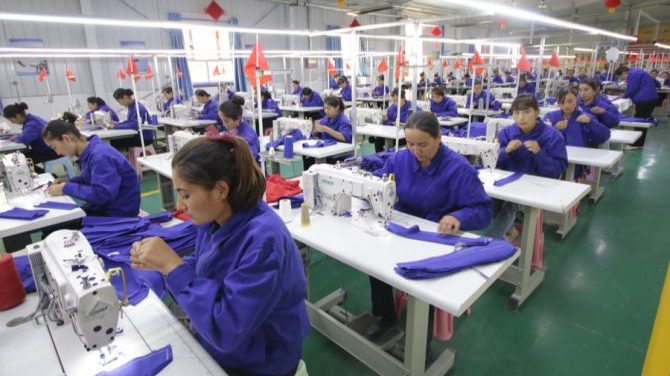The U.S. Senate passed a bipartisan bill on Thursday, Dec. 16 banning goods made with forced labor in the Chinese region of Xinjiang from entering the United States. Now, it heads to the president’s desk to be signed into law.
The Uyghur Forced Labor Prevention Act (H.R. 6256) comes after the U.S. accused China of committing genocide against the Uyghurs and other Muslim ethnic minorities in Xinjiang. Human-rights groups estimate that China has detained more than one million Uyghurs, placing them in “re-education camps.” Some reports, such as one from the Associated Press, accuse the Chinese government of abusing hundreds of thousands of Uyghur women through forced abortion, sterilization, and birth control.
The White House responded favorably to the bill, after it was also passed unanimously by the U.S. House of Representatives on Dec. 14.
“The President welcomes the agreement by Congress on the bipartisan Uyghur Forced Labor Prevention Act,” White House Press Secretary Jen Psaki said in a statement. “We agree with Congress that action can and must be taken to hold the People’s Republic of China accountable for genocide and human rights abuses and to address forced labor in Xinjiang.”
Said Psaki: “The Administration will work closely with Congress to implement this bill to ensure global supply chains are free of forced labor, while simultaneously working to on-shore and third-shore key supply chains, including semiconductors and clean energy.”
Rep. Chris Smith (R-N.J.) and Rep. James P. McGovern (D-Mass.) cosponsored the bill that was later introduced in the Senate by Sen. Marco Rubio (R-Fla.) and Sen. Jeff Merkley (D-Ore.).
Rubio spoke on the Senate floor ahead of the Senate’s passage.
“For those who are not familiar with it at this point, it basically says that you can't import products into the United States that are made by slave labor in Xinjiang, or from entities that are associated with the government of that region,” he said on Thursday. “And if you're a company who is manufacturing in that area, you’re going to need to prove that slaves didn't make it. The presumption is on you.”
He explained that imported goods made with slave labor have been outlawed since the 1930s. But, he said, “it's still happening.”
“Many companies have already taken steps to clean up their supply chains. And, frankly, they should have no concerns about this law,” he added. “For those who have not done that, they’ll no longer be able to continue to make Americans — every one of us, frankly — unwitting accomplices in the atrocities, in the genocide that’s being committed by the Chinese Communist Party.”
After the House passed the bill, Smith stressed that it “prohibits imports from Xinjiang to the U.S. by creating a ‘rebuttable presumption.’”
“And that is the core of this bill — a presumption that all goods produced in the region are made with forced labor unless U.S. Customs and Border Protection certifies by clear and convincing evidence that goods were not produced with forced labor,” he said.
This bill “is important and necessary to end or at least mitigate the United States’ complicity in [Chinese President] Xi Jinping’s genocide,” Smith concluded.

